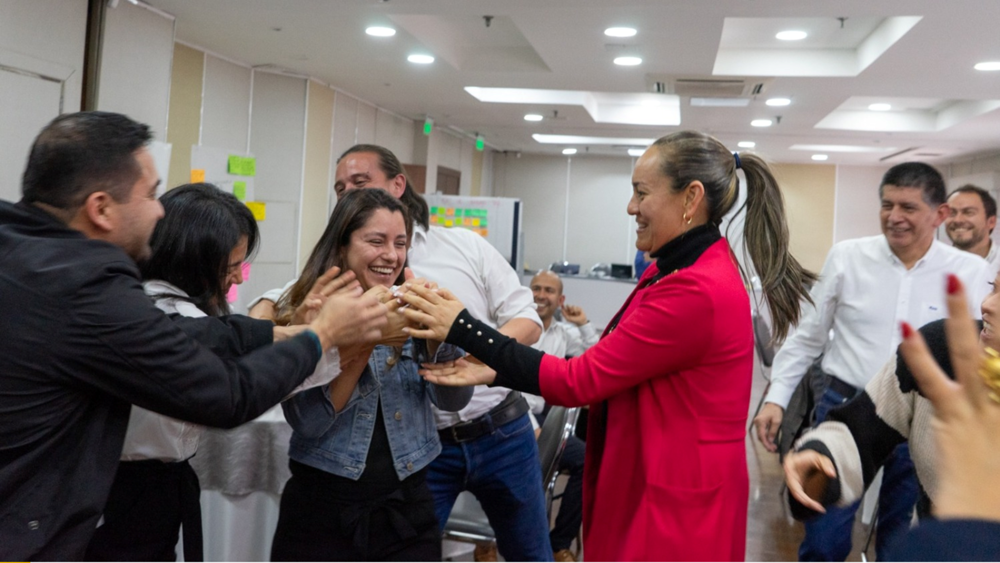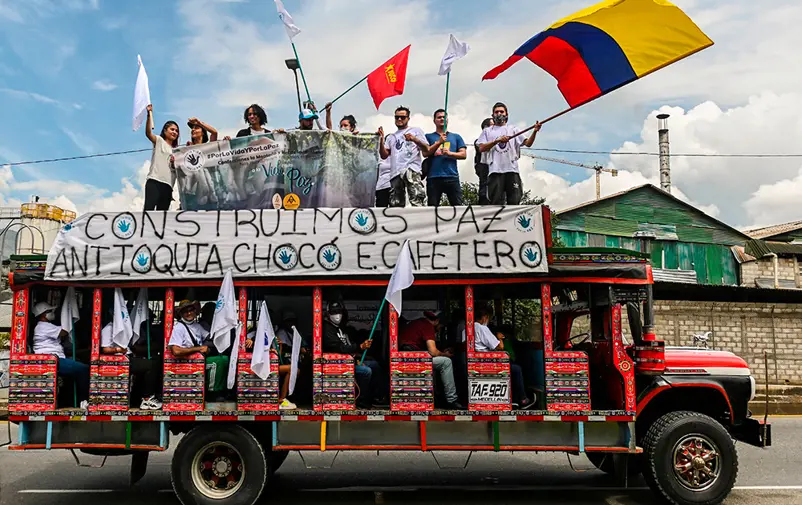Colombia – A Success Story for Peace?
In 2024, global conflict levels are historically high. One country seemingly defying this trend is Colombia, which continues to take cautious steps towards a more peaceful development after nearly 60 years of conflict. Following the peace agreement with the FARC guerrilla in 2016, negotiations are now underway with the largest remaining guerrilla group, the ELN, as part of President Gustavo Petro's comprehensive peace project, Paz Total – total peace. But how well does the image of Colombia as a peaceful success story hold up, and what lessons can be drawn from the country's peace process?Gustavo Petro's victory in Colombia's presidential election in 2022 revived hopes for peace in Colombia. When the peace agreement with the FARC guerrillas was signed in 2016, it marked a milestone after over 50 years of civil conflict, but the subsequent years were largely marked by unrest.
In 2018, the incumbent President Ivan Duque slowed down the implementation of the peace agreement, and negotiations with the second-largest guerrilla group, the ELN, were interrupted in 2019 partly due to a bloody attack on a police academy.
Shortly thereafter, several waves of protests swept across the country. Notably, young people were disappointed with the socio-economic politics high unemployment, violence, and corruption. Tax increases due to the coronavirus pandemic later triggered new protests.
The violence and the police handling of the protests garnered significant global attention and opened new discussions about security sector reform, which had not been possible during the peace process with the FARC.
The political dissatisfaction, and the hope for peaceful development sparked by the FARC agreement, paved the way for Gustavo Petro, the former mayor of Bogotá, to win the presidential election in 2022. Thus, he became the country's first president from the political left, and unlike his predecessor Ivan Duque, he is a strong advocate for the peace agreement with the FARC.
Fabian Fossum Hylin, Jenny Lindqvist and Marcelo Diaz are part of FBA’s Colombia Team.
– There are clear links between Petro's election and the protests, which were largely about issues of justice and police brutality. The hope for peace and change that the FARC agreement represented was probably also a reason why many mobilized for the candidate who advocated dialogue and peacebuilding, says Fabian.
Jenny agrees.
– There has been civil war and conflict in Colombia for over 50 years. The FARC agreement created a more open debate climate where discussions began on issues of equality, the environment, and social injustices, things that were not talked about when the focus was on fighting the guerrillas.
Gustavo Petro has clearly positioned himself as an actor for peace and dialogue. His policies to drive the peace process forward and prevent conflict are encapsulated in the project "Paz Total" (total peace).
The project is ambitious. It entails not only the implementation of the FARC agreement but also simultaneous efforts to negotiate and carry out peace talks with the remaining armed illegal groups in the country.
At the same time, social, economic, and environmental issues need to be addressed to tackle the root causes of the long-standing conflict and break the cycles of violence. Additionally, extensive citizen dialogues are being conducted to ensure that Colombia's population has a say in the process.
Negotiations with the ELN
One of the most notable tracks is the resumed negotiations with the largest remaining leftist guerrilla group, Ejército de Liberación Nacional, (ELN). Previous Colombian governments have attempted negotiations since the 1980s, but now they have succeeded in making more progress than ever before.
Ceasefires have been extended several times, a significant process to promote society's participation in peace negotiations is underway nationwide, and humanitarian efforts in conflict-affected areas have been realized. In the latest round of negotiations, the ELN also committed to cease kidnappings and released the individuals they had kidnapped.
– It's a positive sign. It also carries significant symbolic weight. Some describe the issue of kidnappings as a national trauma; it evokes something when you talk about kidnappings with Colombians. It was incredibly common in the 90s and early 2000s; everyone was affected in some way, says Fabian.
According to Fabian, Jenny, and Marcelo, there are several reasons why the negotiations have now broken new ground. They mention the strong international support for the peace process, in which Sweden, among others, participates as a so-called accompanying country tasked with supporting the negotiations.
There is also an unusually strong willingness to include Colombia's population in the peace process. Therefore, the parties have created a national participation committee, consisting of 81 representatives from various groups and sectors.
Petro leading the first leftist government in Colombia's history may also be a reason, they say. The government prioritizes social, economic, and political justice, as well as involving previously excluded and marginalized groups who have had limited opportunities to make their voices heard in the political system. Local popular support and broad participation have also been among the ELN's core issues historically.
Remaining Challenges
The negotiations with the ELN are an important step towards peace in Colombia. However, whether they will be successful or not ultimately depends largely on the progress of other tracks within Paz Total, especially the implementation of the FARC agreement, argue Fabian, Jenny, and Marcelo.
– The peace agreement of 2016 is crucial for the current process to succeed, as it largely involves building trust and legitimacy for the state by taking on long-term responsibility. Colombian institutions need to develop their own competence and capacity, even in conflict-prone regions. Being able to work on peacebuilding in a long-term, equitable, and structured manner is a prerequisite for what is agreed upon in future peace negotiations to work and be perceived as credible. This could involve how former guerrilla members reintegrate into society and feel secure, reconcile with local communities, find jobs, and engage politically, says Jenny.
Time is also an important aspect, Fabian explains.
– The next election is in 2026, and soon half of Petro's term will have passed. So, in a relatively short time, enough progress needs to be made so that it costs more to backtrack than to continue with the peace process, regardless of who comes to power after the next election.
Like all peace processes, the one in Colombia is not linear. Many issues are sensitive, and successes are interspersed with setbacks. Fabian, Jenny, and Marcelo suggest that whether Colombia's peace process is a success story might only be definitively answered in a few years' time - but the political will for dialogue and attempting to resolve conflicts at the negotiating table is a success and a source of hope in itself.
– Despite persistent challenges, the FARC agreement is often cited as an international success story in peace processes, especially regarding issues of conflict victims and gender equality. It's somewhat ironic; we and most people outside of Colombia talk about the country as a very positive case where there is hope for peace. But in Colombia, it remains a polarized issue. There are many strong critical forces against the government and specifically against the Paz Total project. And it's clear that it's a challenge for the processes to constantly be in the political crosshairs, says Fabian.
At the same time, there are lessons to be drawn from the more unique aspects. One such lesson is that agreements between the government and the ELN are implemented continuously while negotiations are ongoing, instead of being postponed until everything is negotiated and clear.
– In a country like Colombia, which has had such a long conflict, there is a strong culture of resolving conflicts with violence and many groups expressing that. In such a society, it is very important that agreements reached with one group are implemented to show the other groups that it is possible to reach peace agreements and through peaceful means make headway on issues that have been fought over for 60 years, Fabian explains.
What Fabian, Jenny, and Marcelo particularly argue has proven successful in Colombia is the strong focus on inclusion in the peace process. They mention examples such as the government delegation in the ELN negotiations being led by a woman, having gender balance, and including leaders of minority groups as well as military representatives. Even the opposition is represented.
– Today's peace negotiations are often complex and holistic processes that partly involve peace dialogue and mediation, but also much more. It's about involving society at different levels not only after but also during a process so that what comes out at the table reflects the reality and the conflict that the people and the parties are living in. This creates better understanding of the root causes of the conflict, stronger trust from the people, and legitimacy for the process, says Fabian.
– The broad consultation process, as we see it, should increase the chances of long-term sustainable agreements. But including so many also entails challenges and the need for new capabilities to be developed. FBA looks forward to contributing support for both advancing the processes and reforming the institutions and collaborating in the change process that is required, concludes Jenny.

FBA supports the long-term work of implementing the peace agreement from 2016. The picture shows a workshop organized by FBA on gender equality for those responsible for creating reconciliation and integration of combatants in society.
FBA's Work on Peacebuilding in Colombia
FBA supports and collaborates with several of the peacebuilding actors leading Colombia's efforts for peace and development. We provide capacity-building support to institutions working on the reintegration of former combatants, support the reform process that increases civilian control over the country's police and military, and integrate gender equality into peacebuilding institutions, such as the Special Jurisdiction for Peace (JEP).
Our mandate is specified in the strategy for Sweden's development cooperation with Colombia 2021–2025, developed by the Ministry for Foreign Affairs (UD).
Peace negotiations with the ELN
Together with Switzerland, Germany, and Spain, Sweden has the role of accompanying country for the peace negotiations, which entails a mandate to provide political, technical, and financial support to the process. Together with the Embassy in Colombia and SIDA, FBA is one of the authorities representing and supporting Sweden's accompanying role.
FBA contributes with technical expertise, experience from peace processes in both Colombia and other countries, and competence in facilitation. For example, FBA has a senior advisor providing advice at the table in the various negotiation rounds.
FBA's Colombia Team
FBA's Colombia team consists of five employees with expertise in peace processes, gender equality, disarmament, demobilization, and reintegration (DDR), leadership, and democratic governance of the security sector.
Fabian Fossum Hylin is a peace process officer, Marcelo Diaz is a security and peace attaché at the Swedish Embassy in Colombia,, and Jenny Lindqvist is the country manager for Colombia.








 >
> >
>

